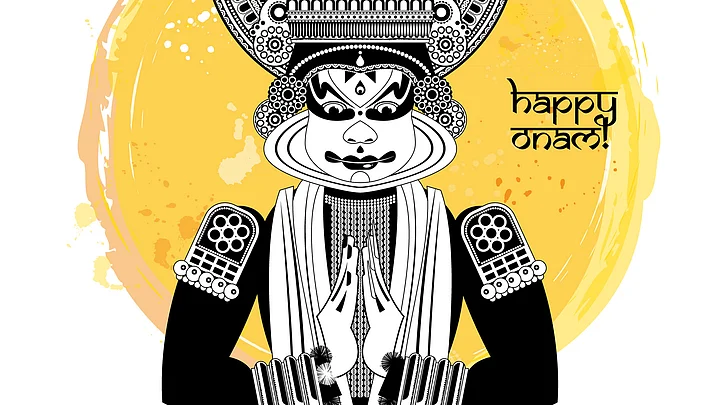It will be Onam this Saturday, 25 August, the festival that brings all Malayalis together, wherever in the world they are. The floods this year will dampen the celebratory air, but not the spirit of the Malayali. After all, Onam is about a joyous comeback, a perennial return.
Unlike most festivals around the world, Onam is not about a victor & his victory. It is about the vanquished and his defeat. As most know, Mahabali, or Maaveli as Malayalis call him, was a beloved Asura King whom the gods, the devas, disliked.
They decided to take him down, using his own generosity as a weapon against him. So one of them went before Maaveli as Vaamana, a diminutive Brahmin, and was, as usual, promised any gift that he desired. He just had to ask.
Vaamana was seemingly modest – he asked for just three feet of land. Maaveli asked him to measure it and take it. Vaamana then grew in size and with two steps he covered the whole of the earth and the skies. And there was no place for the third step!
Maaveli, bound to his promise, bowed before Vaamana & asked him to put his foot on his head. Vaamana did as he was asked & sent the beloved King to the Netherworld, Paatala. Before being dispensed thus, Maaveli asked for one favour.
This was the favour sought: that he be allowed to visit his people once year. He was granted his wish. So every year, during the harvest season, Maaveli arrives for a sojourn among his people, and Onam is the celebration of this annual return.
It is possible, therefore, to see the festival as a protest, a giant middle finger if you like, against the powers that be who sent a beloved and just king to the Netherworld for no good reason than their own jealousy and fear that Maaveli’s renown would pose a threat to them.
There is no ambiguity about whose side the people are on: with the unjustly defeated. But it is not just the story behind the festival that is unique and inspiring. Far more striking are the lines of the Onam song, or Onappattu, that every true Malayali knows by heart.
The song starts with an assertion that is remarkable for its spirit: “When Maaveli was ruling the land, all humans were equal”. Then the rest of the stanza: “They lived happily and there was no danger to anyone.”
The song then goes like this:
There were no worries and no diseases. Evil people were nowhere to be seen. There were none around other than people of goodness. There were no lies, and no cheating and no false promises.
“There were no false measures or crooked weights and no other falsities either.”
Notice that the song says nothing about Maaveli himself, neither his physical powers nor his generosity or other personal qualities. The song only talks about the kind of society that flourished when he was around.
The fulcrum of the song, therefore, is about social relations. Equal dignity of all individuals. Fairness, justice and lack of lies and cheating when people deal with each other. There couldn’t be a better articulation of the ideal society.
Remember that during much of the recent centuries, Kerala was no haven of equality or fairness or justice. It was, as Vivekananda called it, a “madhouse” – of caste supremacy, extreme inequality and prejudice.
But the song kept the flame alive. And so did the story of Maaveli. Ideas, as they say, have consequences. So the next time anyone wonders why Kerala is what it is, one could say: may be Onam had a lot to do with it!
The Maaveli story with its distinctive sympathies, is not a one-off. Some of the folk dance performances of Kerala, like Theyyattam, are built around the stories of those who were punished with death for infringing caste rules.
These performances deified those who were thus killed and kept them alive. Onam in that sense is also a yearly performance that revolts against forgetting, and sets up the right ideals for a society to strive towards.
Onam comes around every year because Malayalis haven’t reached those ideals yet. But they’re on the way. Come hell, or high water!
(This article has been curated from Tony Joseph’s tweet thread, upon the author's permission. Tony Joseph is a writer and is on Twitter @tjoseph0010.)
(At The Quint, we question everything. Play an active role in shaping our journalism by becoming a member today.)
